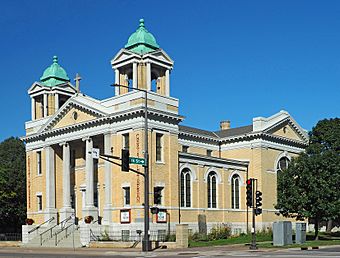Christ Lutheran Church on Capitol Hill facts for kids
Quick facts for kids |
|
|
Christ Lutheran Church on Capitol Hill
|
|

Christ Lutheran Church on Capitol Hill from the southeast
|
|
| Location | 105 University Avenue West, Saint Paul, Minnesota |
|---|---|
| Built | 1909–1915 |
| Architect | Buechner & Orth |
| Architectural style | Beaux-Arts |
| NRHP reference No. | 100004655 |
| Added to NRHP | November 15, 2019 |
Christ Lutheran Church on Capitol Hill is a church located in the Thomas-Dale neighborhood of Saint Paul, Minnesota. It belongs to the Evangelical Lutheran Church in America (ELCA), which is a large group of Lutheran churches in the United States. This church building is special because of its unique design and its history.
Contents
A Special Building: Design and History
The Christ Lutheran Church building was constructed between 1909 and 1915. It is made of brick and stands out because of its Beaux-Arts style. This style was chosen by the architects, Buechner & Orth, to match the grand Minnesota State Capitol building nearby. The church is so important that it is listed on the National Register of Historic Places. This means it's recognized for its historical and architectural value.
Building Details
The oldest part of the church, on the north side, was built first in 1909. The main part of the church, which faces University Avenue, was finished in 1915. It is made of yellow brick. The front of the building is very balanced and features a classic triangular roof shape, called a pediment. This pediment is supported by tall, decorative columns and pillars, with bell towers on each side. Later, in 1962–63, an office section was added. This part now houses the offices for the Saint Paul Area Synod, which is a regional group of ELCA churches.
How the Church Began
The church started a long time ago, in 1868. It was first called the Scandinavian Lutheran Church Society. Later that same year, its name changed to "Congregation." In 1869, it was renamed the Norwegian Evangelical Lutheran Church. In the very beginning, church services were held in people's homes, at the Ramsey County Courthouse, and even in another church called Zion Evangelical Lutheran Church.
Early Church Buildings
In 1870, the church built its own place at L'Orient and Mt. Airy Streets. However, the ground there was very sandy, and the building kept sliding down the hill! So, in 1875, the church building was moved to a new spot at 13th and Canada Streets.
Moving to Capitol Hill
In 1904, a new pastor named Rev. S.T. Reque joined the church. He stayed for 37 years! In 1909, the church bought the land where it stands today, at Park Street and University Avenue. The architects, Buechner & Orth, made sure the new church's design would fit in with the nearby Minnesota State Capitol. The basement of the new building was finished first and used for worship on Christmas Eve in 1911. The main upper church was officially opened on December 5, 1915.
Name Changes and Special Visitors
A few years after the new building was finished, the church's name was changed to "Christ Lutheran Church." In 1962, they added "on Capitol Hill" to the name. This was to show everyone how close they were to the state's government buildings.
A Visit from an Emperor
The church grew quite a bit, and in 1944, it had its largest number of members, with 1198 people. From 1939 to 1952, the pastor was Rev. Joseph Simonson. He was also a chaplain for the Minnesota Senate for 10 years. Later, he was chosen by President Eisenhower to be an Ambassador to Ethiopia. Because of this connection, the Emperor of Ethiopia, Haile Selassie, visited Christ Lutheran Church in June 1954! The Emperor gave the church a special cross, just like one he gave to the National Cathedral in Washington D.C.
Helping the Community
In the 1980s, many new families moved into the neighborhood around the church. These families came from Southeast Asia and Africa. The church wanted to help these new neighbors. So, they started a special program called the Southeast Asian Ministry. This program was created to support and help the new people in their community.
 | John T. Biggers |
 | Thomas Blackshear |
 | Mark Bradford |
 | Beverly Buchanan |



